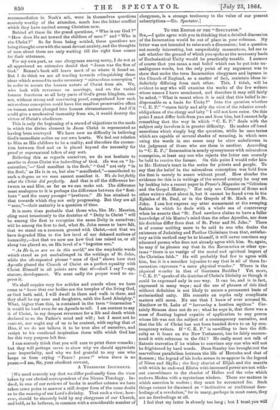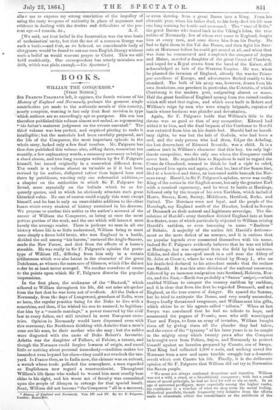To THE EDITOR OF THE "SPECTATOR."
Sia,—I quite agree with you in thinking that a detailed discussion of the Incarnation would be out of place in your columns. My letter was not intended to raise such a discussion; but a question not merely interesting, but unspeakably momentous, led me to ask whether the ground of which you spoke as the necessary basis of Ecclesiastical Unity would be practically tenable. I assume of course that you mean a real belief which can be put into un- ambiguous words, but the only point of my argument was to show that under the term Incarnation clergymen and laymen in the Church of England, as a matter of fact, maintain ideas in- definitely differing from each other. This, I think, will be evident to any who will examine the works of the few writers whose names I have mentioned, and therefore it may still fairly be asked, " What is meant when it is said that this belief is in- dispensable as a basis for Unity?" Into the question whether " C. E. P." "states fairly and ably the view of the relative creed- obligations of the clergy and laity " I will not here enter. On this point I must differ both from you and from him, but I cannot help remarking that the way in which " C. E. P." deals with the subject only involves it in greater difficulty. He makes off-hand assertions which simply beg the question, while he uses terms which are capable of several shades of meaning, in which men using the words in one sense may be utter unbelievers in
the judgment of those who use them in another. According to "C. E. P.," Incarnation is nearly synonymous with miraculous conception, at least any one who rejects the latter can scarcely be held to receive the former. On this point I would refer him to Mr. Hutton's tract in the series for priests and people. To say that the belief in the miraculous conception was held from the first is merely to assert without proof. How slender the evidence for this is in writings of the second century he may see by looking into a recent paper in Fraser's Magazine on "Criticism and the Gospel History." Not only are Clement of Rome and other writers silent about it, but it cannot be found even in the Epistles of St. Paul, or in the Gospels of St. Mark or of St. John. I can but express my utter amazement at the sweeping fashion in which ha deals with a whole sea of controversy when he asserts that "St. Paul nowhere claims to have a fuller knowledge of his Master's mind than the other Apostles, nor does his doctrine differ from that of St. Peter and St. John." There is of course nothing more to be said to one who denies the existence of Judaizing and Pauline Christians than that, satisfac- tory as this method may be to himself, it will never convince any educated person who does not already agree with him. So, again, he may if he pleases say that in the Zoroastrian or other sys- tems "there is no vestige of the moral and spiritual import of the Christian faith." He will probably find few to agree with him, but it is a manifest injustice to say that in all of them In- carnation expresses "a mere physical wonder." Where is the physical wonder in that of Gautama Buddha? Yet more, " C. E. P." speaks of the doctrine of Christ's Divinity as though it could be expressed only in one way. It can be, and is in fact, expressed in many ways ; and the use of phrases of this kind without definition is not likely to secure a permanent basis of ecclesiastical unity. His remarks on myths only complicate matters still more. No one that I know of ever accused St. Matthew or St. Luke of " borrowing a heathen mythus." Cer- tainly Strauss does not do so ; what he says is, that there was a mass of floating legend capable of application to any person whose life was not the subject of a contemporary narrative, and that the life of Christ has not been handed down to us by con- temporary writers. If " C. E. P." is unwilling to face the diffi- culty as it bears on the New Testament, has be fairly encoun- tered it with reference to the Old ? He really must not talk of Satanic travesties if he wishes to convince any one who will not be frightened by bard words. Dean Stanley has brought out the marvellous parallelism between the life of Hercules and that of Samson ; the legend of his locks seems to re-appear in the legend of Niue and Skylla ; the fiery chariot of Elijah and the mantle with which he endowed Elisha with increased power are not with- out resemblance to the chariot of Helios and the robe which endows Medea with a mysterious wisdom. These are matters in which assertion is useless ; they must be accounted for. Such things cannot be dismissed as " instinctive or traditional fore- bodings of a revelation," for in many, perhaps in most cases, they are no forebodings at all.
I feel that my letter is already too long ; but I 'trust you will
alloy me to express my strong conviction of the impolicy of using the rusty weapons of authority in place of argument and evidence in dealing with the doubts and difficulties of the pre- sent age.—I remain, &c., A. Z. [We said, not that belief in the Incarnation was the true basis of ecclesiastical unity, but that the use of a common liturgy was such a basis,—and that, as we believed, no considerable body of clergymen would be found to use our own English liturgy without such a belief as would warrant prayer to Christ. This we still hold confidently. Our correspondent has utterly mistaken our drift, which was plain enough.—En. Spectator.]































 Previous page
Previous page